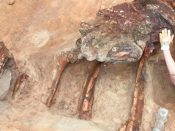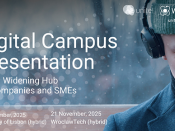Por Jesús Gómez-Gardeñes (University of Zaragoza, Spain).
The ongoing trend of increasing urbanization poses a complex challenge for epidemiology. In highly populated cities, where people interact closely, infectious diseases can spread more easily. Several factors, including higher population density, easier transmission of pathogens, and disparities in socioeconomic status within urban areas, make these places more susceptible to epidemics [1-3]. However, amid these urbanization challenges, cities also offer opportunities for innovative approaches to epidemiology. Recent scientific advancements, particularly in network epidemiology and metapopulation modeling, hold promise for addressing the intricacies of infectious diseases in urban settings effectively [4,5]. In this seminar, we will explore how people's recurrent mobility patterns [6] and their distribution within a city can be used to design efficient testing and containment strategies to combat epidemics, especially when resources are limited.
We will present two applications. First, we will address the efficient allocation of biocontrol resources to abate vector-borne diseases. In 2009, it was discovered that when Aedes aegypti mosquitoes are infected with a bacterium called Wolbachia transmission of the dengue virus from mosquitoes to humans is drastically reduced. Unfortunately, Aedes mosquitoes do not acquire Wolbachia in their natural environment, this bacterium has to be introduced in a laboratory and, then, the mosquitoes are released in areas affected by dengue transmission. A difficult question to answer is how to spatially distribute Wolbachia-carrying mosquitoes so that their immunizing effect reaches and protects as many people as possible. To do this, we begin by developing a data informed metapopulation model that is able to recreate and predict the spatial spread of dengue in a given region [7]. Once the basic ingredients of the spread of dengue disease are understood, the most important geographical areas for the emergence of an epidemic are analyzed, allowing the generation of a geographical immunization ranking.
The second application is a model that allows to identify the ideal locations of test resources within the backbone of the urban transportation network of a city. In particular, the proposed model allows us to calculate the spatial and temporal progression of an epidemic and determine its threshold [8]. Once presented the setup and its behavior we will leverage on the new ingredient introduced in our model to identify those critical fluxes that trigger the onset of epidemic waves in urban environments. Then we explore a practical surveillance strategy that involves limited daily testing resources. We target these tests at individuals traveling through the identified critical pathways. Our findings indicate that by concentrating tests on a small number of travel routes (those identified as most critical), we can achieve optimal mitigation, resulting in a lower attack rate, a reduced and delayed epidemic peak, and an early alert for public health systems. To conclude, we present a realistic application of our strategy by mapping critical mobility flows between different city areas into routes between major public transportation stations.
Bibliography:
- [1] E. Alirol, L. Getaz, B. Stoll, F. Chappuis, and L. Loutan, Lancet Infectious Diseases 11, 131 (2011)
- [2] V.J. Lee, M. Ho, C.W. Kai, X. Aguilera, D. Heymann, and A. Wilder-Smith, Lancet Infectious Diseases 20, 527 (2020)
- [3] S. Hazarie, D. Soriano-Paños, A. Arenas, J. Gómez-Gardeñes, and G. Ghoshal, Communications Physics 4, 1 (2021)
- [4] V. Colizza, R. Pastor-Satorras, and A. Vespignani, Nature Physics 3, 276–282 (2007)
- [5] D. Balcan, V. Colizza, B. Gonçalves, H. Hu, J. J. Ramasco, and A. Vespignani, Proceedings of the National Academy of Sciences (USA) 106, 21484 (2009)
- [6] J. Gómez-Gardeñes, D. Soriano-Panos, and A. Arenas, “Critical regimes driven by recurrent mobility patterns of reaction–diffusion processes in networks”, Nature Physics 14, 391–395 (2018)
- [7] A Reyna-Lara, D Soriano-Paños, JH Arias-Castro, HJ Martínez, J Gómez-Gardeñes, Chaos 32, 041105 (2022)
- [8] Valgañón, D. Soriano-Paños, A. Arenas, J. Gómez-Gardeñes, Chaos 32, 043102 (2022)



















